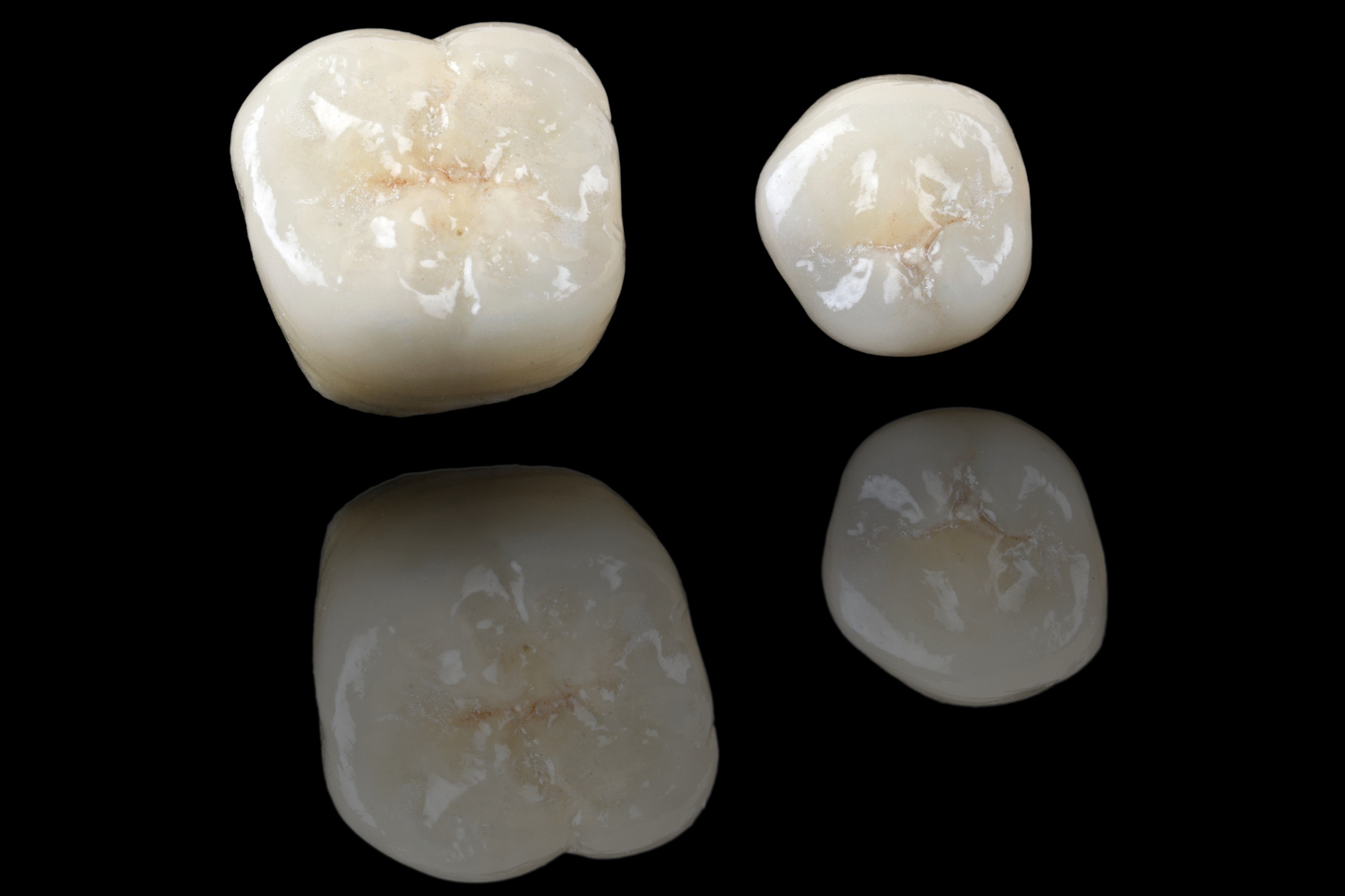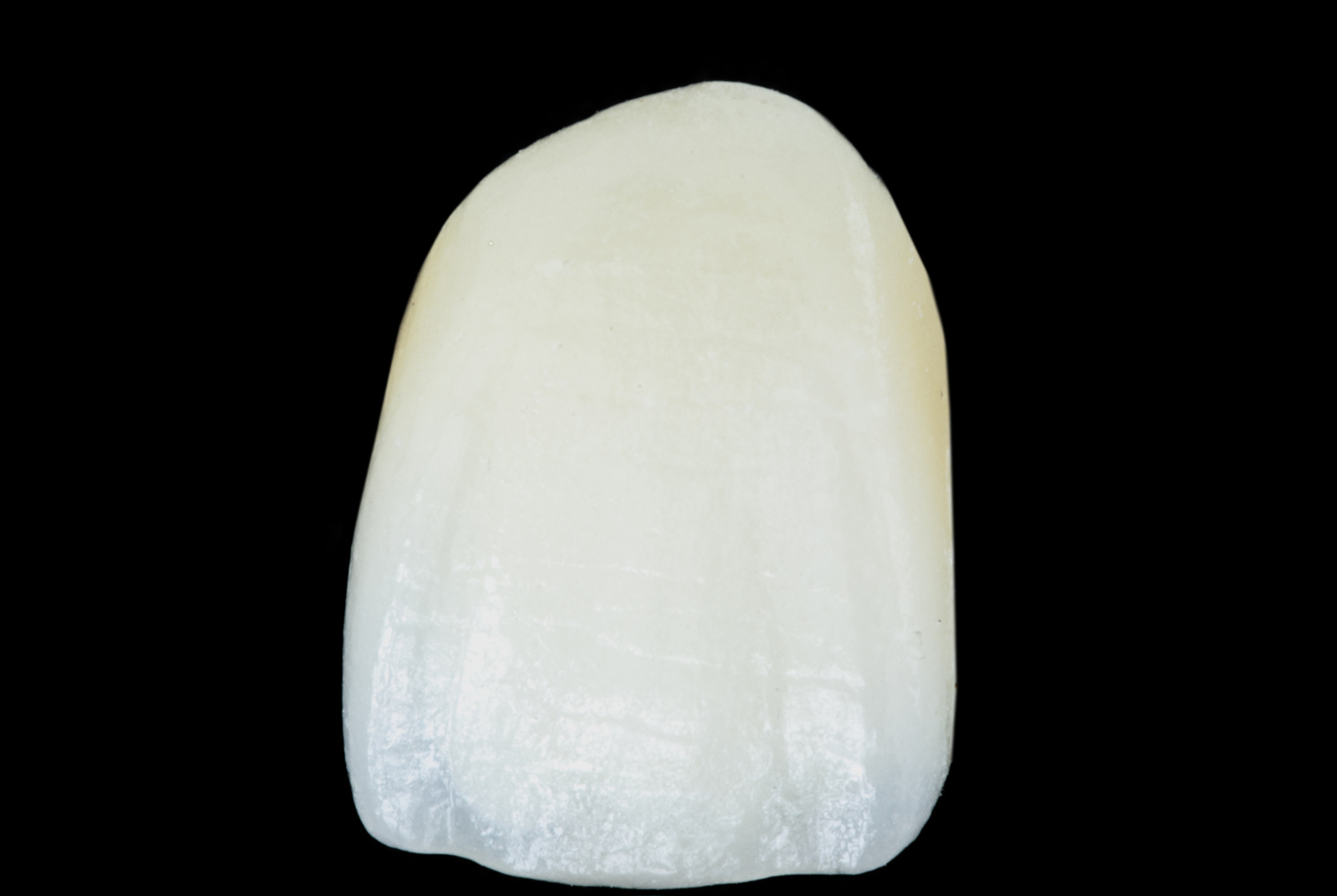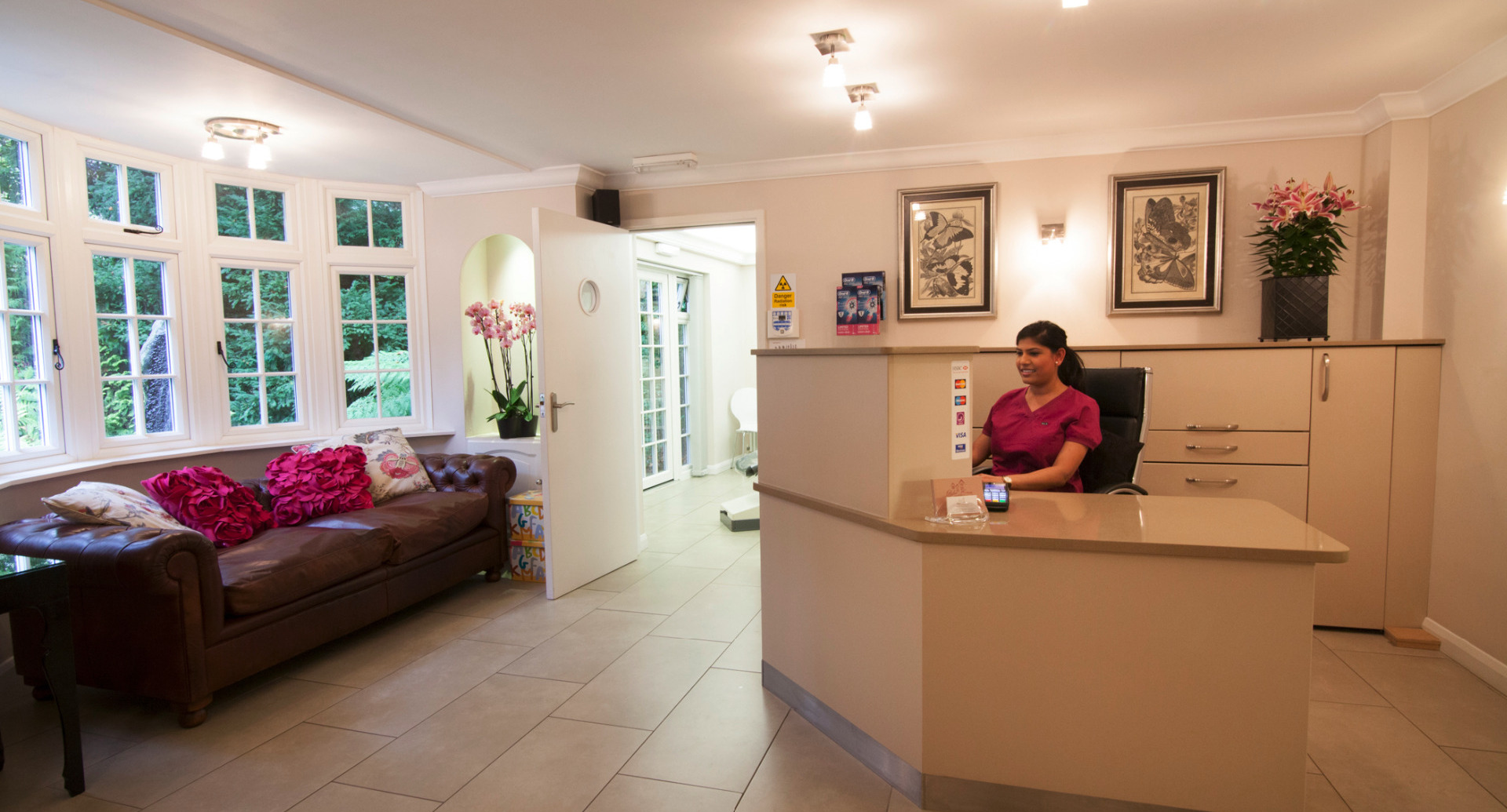we look forward to welcoming new patients to our dental practice in Virginia Water, Surrey

Crowns
What is a crown?
Crowns are sometimes also known as caps. They are custom made, precision fit restorations that are usually manufactured in a dental laboratory by a dental technician. A crown is used to entirely cover a tooth. The crown replaces missing tooth structure and protects the remaining tooth structure against developing cracks and further breaking.
Why would I need a crown?
They are an ideal way to restore teeth that are moderately to severely broken or have been weakened by decay or a very large filling. A crown could also be used for several other reasons, for example:
you may have a heavily filled discoloured tooth which cannot be improved with bleaching.
you may have had a root filling and need a crown to protect what is left of the tooth to prevent it breaking
it may help to hold a bridge or denture firmly in place.
What does it involve?
In a nutshell:
You will need to have at least two visits. At the first visit, we will prepare the tooth, take the impressions, make a note of the shade of your tooth, and fit a temporary crown. At the second visit, your dentist will fit the permanent crown. There will usually be about 2 weeks between appointments.
A bit more detail:
To have a crown made usually takes two appointments with us. During the first appointment your dentist will prepare the tooth to the ideal shape for the crown. This will involve removing a layer of the outer surface, leaving an inner core for the crown to fit over. The amount of the tooth removed will be the same as the thickness of the crown.
Once the tooth is shaped, the dental team will take an impression (mould) of the prepared tooth, one of the opposite jaw and possibly another to show the way you bite together.
The impressions will then be given to a dental technician, along with information about the shade to use and any other information they need.
A temporary crown will be made and cemented over the prepared tooth with a temporary cement, so that you can use the tooth while you wait for the crown to be made. So, don't worry you won't be left with half a tooth while your final crown is being made by the technician. This temporary crown may sometimes be a little more noticeable but remember that it is only temporary.
What is a crown made of?
Crowns can be made of a variety of different materials and new materials are continually being introduced. At Glebe House Dental Care, we provide mainly the following types of crowns:
All-ceramic crowns:
Our ceramic crowns are mainly manufactured using IPS e.max which is a ceramic that has optimized translucency, durability and strength. This material can be used on front and back teeth. Usually, we associate ceramics with tableware or china. The art of manufacturing ceramics is indeed one of the oldest crafts in the world. Today, special ceramics are also used in dentistry to give patients lifelike, natural-looking smiles. IPS e.max is a ceramic material which combines strength and beauty unlike any other dental restorative.
Tooth restorations made of all-ceramics do not contain metal. Therefore, light can shine through them as it does through natural teeth. All-ceramic materials stand out for their:
aesthetic and natural appearance
long-lasting quality and strength
variety of colours
compatibility with the human body
Porcelain bonded to precious metal (PBC):
These crowns are made from metal (can be precious or non- precious metal) substructure and porcelain is then bonded to the metal to cover it and give it a white colour. This technique has been used for many years and pre-dates the evolution of all-ceramic crowns. They are generally not quite as aesthetic as ceramic crowns and as gums recede with age, a dark grey line may possibly be seen above the crown and this can lead to an unsightly smile. This grey line is the metal in the crown. This does not occur with all ceramic crowns. Having said that, we still use porcelain bonded to metal crowns at Glebe House as they durable and some patients choose to have them as it offers a more cost- effective treatment option, particularly on back teeth.
Gold-alloy crowns:
Gold is one of the oldest filling materials. Today it is used with other precious metal alloys to increase its strength, which makes it very hardwearing and durable. Gold -alloy has been a successful restoration for many decades. It has the most similar wear characteristics to natural tooth enamel and therefore is very effective on back teeth, especially in people who grind or clench their teeth. The nature of gold as a material also allows minimal tooth preparation (as it can be made in thicknesses of less than 1mm), thus preserving more healthy tooth structure during the preparation.
What is a post crown?
In root canal treated teeth it may be necessary to insert a post into the tooth root before placing a crown. A post gives support and helps the crown to stay in place if there isn't sufficient tooth structure present to hold the crown.
Space is created for the post in the root of the tooth by removing some of the root canal filling. A post can be made of prefabricated stainless steel or fibre (tooth coloured) which the dentist can fit directly into the root canal. Or a custom-made post can be constructed by a dental technician in the laboratory using a precious metal alloy, to accurately fit the shape of the prepared root canal. The post is placed into the root canal by cementing into position, ready for the crown to be attached.
Does it hurt to have a tooth prepared for a crown?
No, you will have a local anaesthetic and the preparation work should feel no different from having a filling, it just takes a little longer as there are a few additional steps involved. If the tooth does not have a nerve because it has had a root canal treatment, you may not need any local anaesthetic.
Will the crown be noticeable?
The crown will be made to match your other teeth as closely as possible. The shade of the surrounding teeth will be recorded, to make sure that the colour looks as natural as possible.
Will the crown feel different?
Because a crown is a custom- made product it may initially feel slightly different from the shape of your tooth before it was crowned and therefore you may be aware of it at first. Within a few days it should feel fine, and you will not notice it.
What will it cost?
Costs will vary according to the type of crown and the material used. We will always discuss the options with you first and provide you with a written estimate and treatment plan before starting any dental treatment.
How do I care for my crown?
It is important to keep the crown just as clean as you would your natural teeth. The crown itself cannot decay, but decay can start where the edge of the crown joins the tooth. Brush last thing at night and at least one other time during the day with a fluoride toothpaste, and clean in between your teeth with 'interdental' brushes or floss once a day. It is also advisable to avoid eating very hard, crunchy or sticky food like toffees and mints as this can break or dislodge crowns and fillings. If you grind or clench your teeth often you will wear your natural tooth structure away and may eventually break your teeth, fillings and crowns. For these patients we advise that you wear a custom made nightguard while you sleep to protect your teeth and restorations. This can also help to prevent headaches that can sometimes be caused by clenching and grinding at night.
How long will the crown last?
How long your crown lasts depend on how well you look after it and whether you clench or grind your teeth frequently. Properly cared for crowns should last for many years. Your dental team will be able to tell you how long your crown may be expected to last.

Bridges
What is a bridge?
Bridges is a fixed replacement for a missing tooth or teeth and just like crowns they can be made from either porcelain fused to metal or ceramics.
Types of bridges
Traditional bridges:
Essentially the teeth next to the gap (one tooth on either side) are prepared to take crowns as described under crowns. The laboratory them manufactures a false tooth made from porcelain or ceramic (called a pontic) which is fused to two crowns (called abutments) one on either side of it. This is one solid unit and it is cemented onto the prepared teeth on either side of the gap just like crowns
Cantilever bridges:
When only one tooth next to the gap is used hold the bridge.
Maryland bridges (also called a resin-bonded bridge)
Here the false tooth (pontic) is held in place with metal wings that are fixed to the back of the anchoring abutment teeth on one or either side of the gap. They are generally more suitable for patients with small gaps at the front of their mouth, and not for spaces of more than one tooth. Maryland bridges require no or very little preparation of the teeth next to the gap. They are cheaper than conventional bridges and involve less tooth preparations, but they generally do not last as long.
Implant retained bridges:
Traditional and cantilever bridges can also be cemented or attached to implants instead of natural teeth. This means that you do not necessarily require an implant for every missing tooth.
What are bridges made off?
Just as with crowns we use mainly porcelain bonded to metal or ceramic (IPS e-max)
What about the cost, longevity and care of a bridge?
These are exactly as described under crowns.

Veneers
What is a veneer?
A veneer is a thin layer of porcelain or ceramic made to fit over the front surface of a tooth. They are custom made, precision fit restorations that are manufactured in a dental laboratory by a dental technician and are usually used on the front teeth. Sometimes a tooth coloured filling (also called a composite material) can be used instead of porcelain.
When would I need a veneer?
Veneers can improve the colour, shape and position of your teeth. A veneer can make a chipped tooth look whole again. The porcelain covers the whole of the front of the tooth, with a thicker section replacing the broken part. Veneers can also be used to close small gaps, when orthodontics (braces) are not suitable or possible.
Veneers are not suitable to restore very badly broken down or root canal treated teeth. These are more reliably restored with crowns as they need more protection.
What are the advantages of veneers?
Veneers restore teeth to look natural and healthy. Because they are very thin and are held in place by a special, strong adhesive, often minimal tooth reduction (removal) is needed.
How are teeth prepared for a veneer?
Some the outer enamel surface on the front and the tip of the tooth will usually have to be removed. The amount of enamel removed will be the same as the thickness of the veneer to be fitted so will vary on average between 0.3mm (along the gum line) to 1mm (on the tip of the tooth). If the tooth is quite badly chipped or damaged by acid erosion for example, then it is possible that hardly any tooth structure will have to be removed as it is already missing! A local anaesthetic (injection) may be used to make sure that there is no discomfort. Just like with crowns and bridges once the tooth has been prepared, the dental team will take an 'impression' (mould). This will be given to the dental technician, along with any other information needed to make the veneer. The colour of the surrounding teeth is matched on a shade guide to make sure that the veneer will look as natural as possible.
How long will it take?
A veneer takes at least two visits. The first is to prepare the tooth and match the shade, and the second is to fit it. Before bonding it in place, your dentist will show you the veneer on your tooth to make sure you are happy with it. Bonding a veneer in place is done with a special adhesive, which holds it firmly on the tooth.
How long will a veneer last?
How long your veneer lasts depend on how well you look after it. They can last for up to 10 years sometimes longer, but they can chip or break just like your own teeth can, particularly if you clench or grind your teeth frequently. Your dental team will tell you how long each veneer should last.
How do I look after my veneers?
It is important to keep your veneers just as clean as you would your natural teeth. The veneer itself cannot decay, but decay can start where the edge of the veneer joins the tooth. Brush last thing at night and at least one other time during the day with a fluoride toothpaste, and clean in between your teeth with 'interdental' brushes or floss once a day. It is also advisable to avoid biting into very hard or crunchy food like apples as this can eventually break or dislodge your veneers. If you grind or clench your teeth often you will wear your natural tooth structure away and may eventually break your teeth, fillings and crowns and veneers. For these patients we advise that you wear a custom made nightguard while you sleep to protect your teeth and restorations. This can also help to prevent headaches that can sometimes be caused by clenching and grinding at night.
What about alternatives?
A natural-coloured filling material (composite) can be used to repair and fill front teeth or they can also be used to cover the whole front surface of a tooth just like a porcelain veneer. These are also referred to as direct veneers as they are placed on the tooth in one visit just like a filling.
Advantages of composite veneers over porcelain veneers
Cheaper than porcelain veneers
Only requires one appointment
Can be repaired more easily if it fractures
Is often a little more conservative (less tooth removal)
Disadvantages of composite veneers over porcelain veneers
Not quite as aesthetic as porcelain
Not as strong or durable as porcelain
Crowns are used for teeth which need to be restored and protected - either because they have broken quite badly or have been weakened by a very large filling, or have had root canal treatment.

MAKING AN APPOINTMENT
Tel: 01344 844507 please do leave a message if we do not answer immediately and we will return your call as soon as possible.
Alternatively, please complete our online form.
New patients welcomed at our dental practice in Virginia Water, Surrey

WONDERFUL SERVICE
The practice is very professional and friendly, and Chris puts a patient at ease, and I would recommend the practice to friends. As my husband has Parkinsons, there is always a caring atmosphere.






